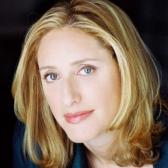JUDY GOLD:
The Holocaust is the most unfunny thing in the world. But there are jokes about the Holocaust that are funny, which I find fascinating. And if I can mention the Holocaust at least once during my show, then I’ve done my job.
ALEISA FISHMAN:
Comedian Judy Gold is known for pushing boundaries with her humor. In her stand-up and her stage show titled “25 Questions for a Jewish Mother,” Gold makes jokes about her family and her identity as a Jew and a lesbian. Humor, Gold says, can promote dialogue and be a way to address prejudice, antisemitism, and even terrible tragedy.
Welcome to Voices on Antisemitism, a podcast series from the United States Holocaust Memorial Museum made possible by generous support from the Oliver and Elizabeth Stanton Foundation. I’m your host, Aleisa Fishman. Every month, we invite a guest to reflect about the many ways that antisemitism and hatred influence our world today. Here’s comedian Judy Gold.
JUDY GOLD:
I believe that I must say on stage that I am gay, that I am Jewish, because that’s my experience. You know, I’ve been doing this for, what, 25 years. I don’t need to prove anything to myself anymore. It’s more about, now, as I get older, talking about really important things. And when you address issues in a funny yet non-threatening, yet edgy, subversive way, it’s pretty powerful.
I tend to do jokes that really push people’s buttons. And I have a joke about when I visited the Anne Frank house. And I talk about how my family would have not survived in the Anne Frank house because my mother is so loud. Gets a big laugh. Also insults people. And I’ve gotten criticized that I promote the stereotype of the Jewish mother. But, you know what, I have a Jewish mother and I’m going to talk about my Jewish mother. And I feel that since I do talk about the Holocaust in a way that makes people think and makes people laugh, that I’m not forgetting, that I’m doing some kind of duty here. It’s sort of acknowledging—this happened. And you can say profound things and make them funny and make people think. I think good comedy makes people think.
I am a Jew and I’m entitled to discuss antisemitism, my Jewish mother. Even if it offends someone, I believe that certain comics are entitled to discuss certain topics. And it’s called a sense of humor. It’s a sense, like smell. Like some people like pizza, some people don’t. Some people think some things are funny, some people don’t. I feel like I have to trust my instincts. And I know when I’ve gone too far. But it really is the way I think, like a rabbi thinks, “How can I teach a lesson?” A comic thinks, “How can I make this funny?” And sometimes it’s the worst tragedy in the world. I mean, there are gray areas. You are putting things out there that people don’t want to talk about sometimes. But I do believe that "the joke" can open people’s eyes and minds up. And when you don’t talk about things, that is the most destructive thing in the world.
ALEISA FISHMAN:
Voices on Antisemitism is a podcast series of the United States Holocaust Memorial Museum. Join us every month to hear a new perspective on the continuing threat of antisemitism in our world today. We would appreciate your feedback on this series. Please visit our website, www.ushmm.org.

